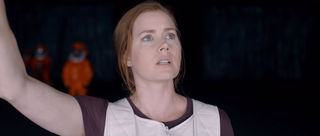From the description, this strikes me as a sci-fi film worth seeing. Although the prospect of encountering extraterrestrial life forms is the stuff of fantasy, what isn't fantasy is the fact that we as humans encounter fellow humans who are often quite diverse in their spoken languages, customs, and so on. How do we communicate with one another? How do we develop enough trust to arrive at beneficial resolutions to a potential conflict? What sorts of strategies are realistic for doing so peacefully? At a point in time when trust and goodwill are in short supply, it is worthwhile to see the behaviors that exemplify those qualities modeled on the big screen, and eventually on Blue Ray and streaming services.
In Arrival, we get to know the character of Dr. Louise Banks, and to see what she’s capable of in an extraordinary situation. Not only is it rare, percentage wise, to see a highly educated, White, middle-aged woman in the role of the extraordinary hero, the particular story we tell about Dr. Banks is inspiring. She is a quiet hero whose successes in life have centered around her talent for languages.When put in incredibly stressful situations, she feels the stress, but she moves forward anyway, relying on her own judgment. Here is a image from Arrival in which Dr. Banks makes a decision about how to speak to the aliens. She decides to take off her protective gear and reach out physically to them.
In a world where ongoing aggressions at home and abroad are on most people’s minds, there are other elements of the story that many of us may find reassuring. Louise chooses to put herself at physical risk while remaining non-aggressive and committed to communication. She endures others’ doubts and presses for factions from around the world to work together because she believes it is the only way to solve the problem for the collective good.
At a time when so many films offer the same solution – kick butt until the world does it your way – this film shows us a refreshing alternative. I do understand why we enjoy fantasies where we punch, kick or shoot people until we achieve world peace. However, since we use stories to inspire us in our own lives, this approach is only so useful. How often do most of us solve our problems by beating people up until they cooperate? (Some do metaphorically!) Dr. Banks’ character represents not only women, but all of us because her solutions are much more like ones we might actually use.
(Snip)
Like many films, at the center of this story are a man and a woman working together. Here, we have Jeremy Renner as Dr. Banks’ colleague, Dr. Ian Donnelly. Dr. Donnelly plays a supportive role. While a loving relationship develops between the two, the story doesn’t rush to conclude that romance solves anyone’s problems.
The message of Arrival is, in fact, much deeper than that. What it offers is an existentialist view about life –that, despite the pain, choosing love in the face of life’s twists and turns is the only good choice we have.
The blog of Dr. Arlin James Benjamin, Jr., Social Psychologist
Sunday, November 20, 2016
A reminder that media narratives can be positive
Although positive narratives in our mass media are few and far between, it seems, I am always delighted when I can find one. This description of the protagonist from the new film Arrival strikes me as one of those rare moments (be aware of spoilers in the following description, as my friend who composed the following paragraphs would likely want to remind the reader):
Subscribe to:
Post Comments (Atom)

No comments:
Post a Comment